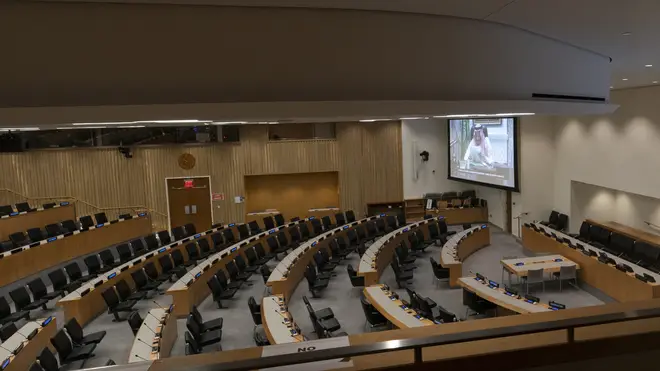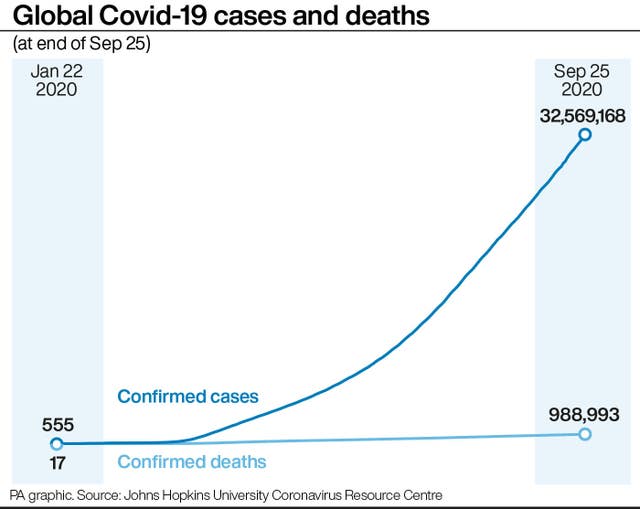
Ben Kentish 10pm - 1am
26 September 2020, 09:44

This year’s UN General Assembly features leaders communicating only in pre-recorded speeches.
European leaders have criticised a collective failure to vanquish the coronavirus pandemic, telling the UN General Assembly that the time has come for countries to reinvent international cooperation.
This year’s unusual work-from-home General Assembly – with leaders communicating only in pre-recorded speeches – comes as Covid-19 cases escalate in many regions but especially in Europe, where some of the most advanced hospitals in some of the world’s richest countries are again under strain.
Spanish prime minister Pedro Sanchez said: “This emergency has, more than a thousand treaties or speeches, made us suddenly realize that we are part of one single world.”

EU Council president Charles Michel said the pandemic “has also revealed the fragility of countries that thought they were strong. It has thrown us all into the same sudden battle, against the same common enemy”.
The virus has also exposed weaknesses within the European Union – a body founded on the ashes of the Second World War, like the UN, to avert new conflict and encourage cooperation. The latter has been in short supply this year.
The EU has fought internally about access to equipment and vaccines, erected barriers among neighbours to keep out virus infections, and struggled to agree on collective solutions to fight Covid-19.
Italy’s prime minister Giuseppe Conte, whose country became a global symbol of the crisis as the first in the west to face a vast wave of infections, said the pandemic should offer world governments “the opportunity for collective renewal”.
“The only guarantee against the use of these abhorrent weapons is their total elimination.”
— @antonioguterres on Saturday's International Day for the Total Elimination of Nuclear Weapons. https://t.co/ol5Q5uoM7O pic.twitter.com/vCcXtJeZkX
— United Nations (@UN) September 26, 2020
He added: “This tragedy has changed us, but has also offered us the opportunity for a new beginning that is up to us to seize.”
Worldwide, the confirmed Covid-19 death toll is nearing one million, though experts believe the real toll is likely higher.
In times of global crisis, Europe’s rich governments are often looked to for financial and material aid for poorer ones. But this time, they are preoccupied with troubles of their own.
As infections rise, EU countries are again imposing quarantines on visitors from neighbouring nations. Spain has imposed a local lockdowns, the French Open tennis tournament is curtailing access, and Covid intensive care units in the Mediterranean city of Marseille are reaching saturation.

Meanwhile, the pandemic has wrecked livelihoods and darkened the world’s economic outlook, damaging the whole concept of multilateralism that European leaders have long embraced.
Mr Sanchez said: “In every corner of the world today, there is a young man, a young woman, looking at their mobile phone screen.
“In the most secluded streets of Naples, in a fish market in Instanbul, in the Zocalo in Mexico City, in the Ecuadorian Amazon, or in a market in India.
“These young people have seen their fathers, their mothers, work ceaselessly. And maybe these young people wonder why their fathers, their mothers, work ceaselessly if nothing changes around them.
#Covid19 😷 Human Rights ⚖️Peace 🕊 #ClimateAction ♻️
Those are just some of the global issues discussed on day 5 of #UNGA . https://t.co/VWvjoYGE5T pic.twitter.com/tECziuk8zK
— United Nations (@UN) September 26, 2020
“Exactly when did we decide that the expression ‘to change the world’ had lost all sense and meaning? I wonder if any of those millions of young people are watching us right now, on their mobile phones. I wonder what they’re thinking of us, if so.”
He also lamented the extra toll the virus has taken on women, “who have taken on the greatest burden of care and attention”.
Czech prime minister Andrej Babis said it is time for Europe to “redefine its role in the world”, and took aim at the World Health Organisation’s (WHO) management of the virus.
Other leaders called for boosting the WHO’s powers and its funding. Greece’s prime minister Kyriakos Mitsotakis appealed for more international help over its migrant crisis after feeling abandoned when fellow EU countries closed their doors to refugees arriving on Greek shores.
EU Council president Charles Michel used the virtual UN pulpit to lash out at the UK for its threats to renege on parts of the Brexit treaty it signed with the EU.

Such treaties are seen as a cornerstone of the international system that the UN represents, and Britain’s threats are seen as a further unravelling of that structure in a time of growing nationalism worldwide.
Pope Francis said the world has a choice to make as it tries to emerge from the Covid-19 crisis and address the grave economic impact it has had on the planet’s most vulnerable: either greater solidarity and multilateralism, or a self-retreat into greater “individualism and elitism”.
Echoing many speakers at this week’s virtual gathering, Dutch prime minister Mark Rutte said the pandemic should be a wake-up call for the world and the UN itself.
“If we’re truly going to defeat this virus we’ll have to do even more to enhance international cooperation,” Mr Rutte said.
“We can’t tackle today’s challenges with yesterday’s structures.”
Other leaders used the UN virtual floor to call attention to conflicts from Kashmir to the Middle East to Georgia in the Caucasus.
Palestinian president Mahmoud Abbas called for an international conference next year to launch a “genuine peace process” for his region.